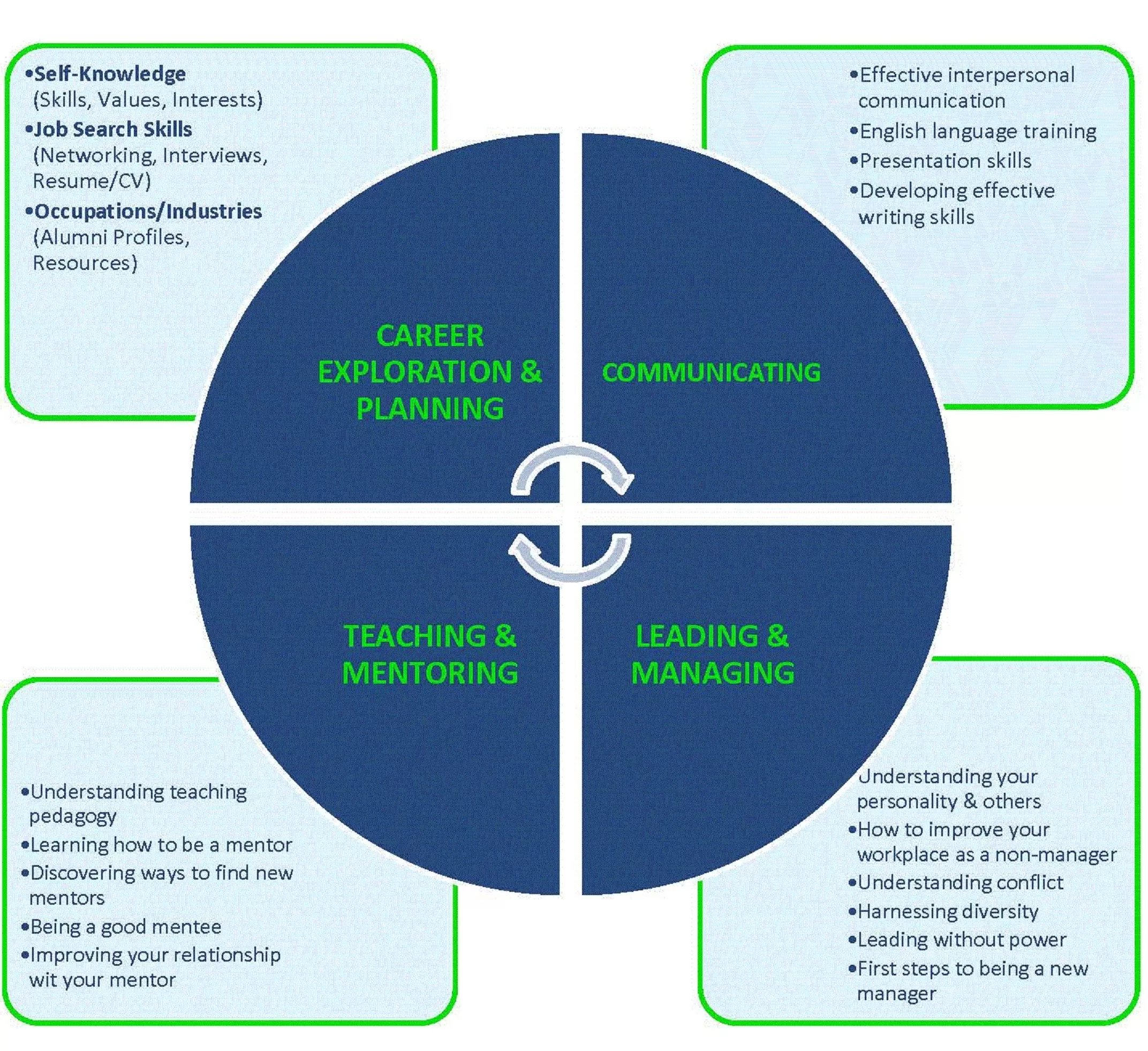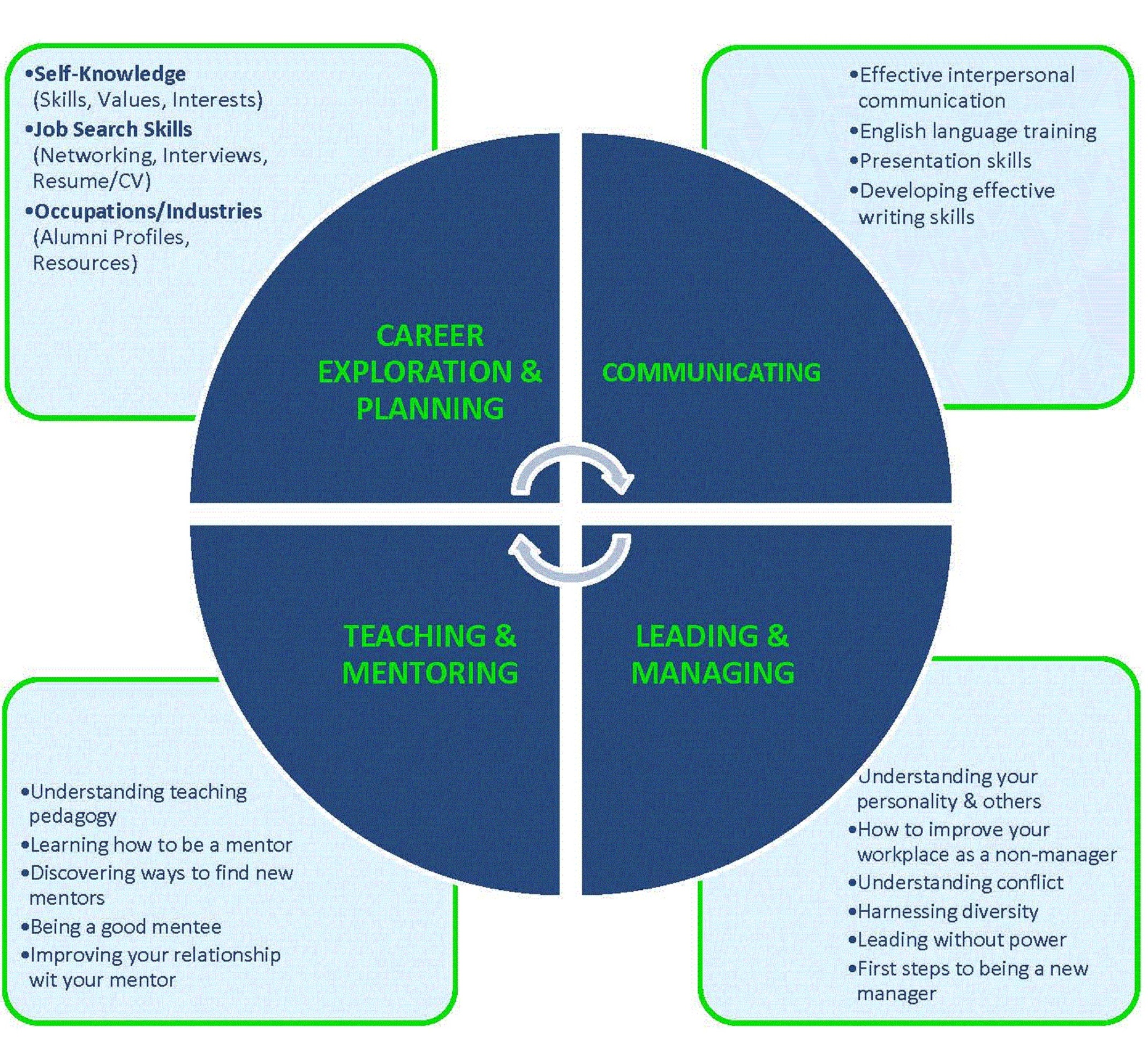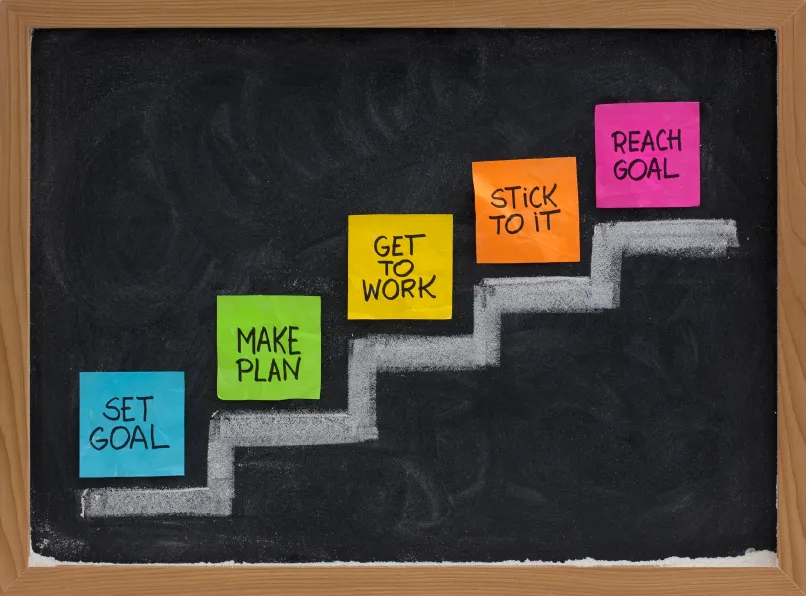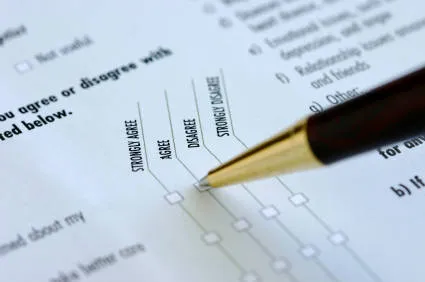2014 Career Success Plan





Recently, the staff here in the OITE had a dose of our own medicine. Our boss asked us to complete a document about our professional goals and needs. This document reminded many of us about how we tell trainees to “fill out an IDP”. For a group of professionals in the career development field, we were all surprised how hard this document was to complete. Now, we have a whole new appreciation of what our trainees struggle with when we ask them to do the same thing. A favorite quote from one personal document was: “These goals seem a bit random, because at the moment that is how I feel about preparing for the next step. A bit out-of-focus and not sure where to go next; I am not sure what I am missing.” Sound familiar?? So why was it so hard for us?
How did we overcome the challenges? Taking time to sit and think. This is the type of exercise that takes time, and time is always a limited commodity. We are all busy. But, like exercising, this is one of those things you need to do for your personal good. We all finally had to set a deadline, and for many of us this is the reason we finished. Find a way to structure your thinking. For some of us, that was pulling out an IDP document. Others of us did a personal SWOT (strengths, weaknesses, opportunities and threats). Some people made lists of items. Whatever works for you, find a way to give yourself some starting points so you are not just looking at a blank piece of paper. Asking career mentors. Hopefully you have heard our mantra of multiple mentors. Here in the office we chatted with each other (peer mentors) and other staff to put some ideas on the table to discuss the pros and cons. Realizing that this is just a process, and not a commitment. The goal here is to have a document to start a career journey, not to make a long term contract to a particular career choice. By continuing the conversation with a career coach, thinking more, and exploring-- this document will morph as we make choices for our futures.

Career assessments are valuable tools to help you during your career exploration and planning. They can be a great starting point and the results can help you think more deeply about your own personal preferences and career interests. Two formal assessments are the Myers-Briggs Type Indicator (MBTI) and the Strong Interest Inventory. To take these assessments, questions are answered online and then the results are shared and discussed during an appointment with a career counselor. A career counselor can also help you determine which assessment (if any) is right for you; however, this blog will give you an overview of each assessment through the lens of three questions: 1. What is it? 2. Why should you take it? 3. How can you use the results? MYERS BRIGGS-TYPE INDICATOR (MBTI) 1. What is it? The Myers Briggs is an assessment with the aim of measuring your personality preferences along four different dichotomous dimensions. The MBTI helps people answer the following questions: Where do you focus your attention and/or get your energy?; How do you prefer to take in information?; How do you make decisions?; and finally, How do you organize the world around you? Isabel Myers and Katharine Briggs extrapolated these dimensions from Carl Jung’s theories regarding psychological types. Myers and Briggs believed that in order to have a more satisfied life, people needed to better understand themselves which could then help them choose an occupation which better suited their personality. 2. Why should you take it? Today, the Myers Briggs is one of the most widely used instruments. Many people find it useful as a way of understanding themselves, as well as their commonalities and differences with others. Not only is it often used as a tool for self-understanding and career development, but many organizations also use this assessment for the purposes of team building, management/leadership training, and to help recognize differences in communication styles – all of which have direct implications during every phase of one’s job search. 3. How to use the results? The Myers Briggs will not tell you specific career paths you should choose; however, you can utilize your results to consider the pros and cons of different employment sectors/occupations and how much they match with your personal preferences. STRONG INTEREST INVENTORY 1. What is it? The Strong Interest Inventory was written by psychologist, E.K. Strong, Jr. in 1927 with the purpose of helping individuals exiting military service to find suitable occupations. Today, the Strong Interest Inventory is based on John Holland’s theory of occupational themes. Work environments are classified into six different theme codes -- Realistic, Investigative, Artistic, Social, Enterprising, & Conventional (RIASEC). Generally, the Strong gives each test taker a three letter code representing their highest matches. 2. Why should you take it? This is a helpful tool if you are uncertain about your career interests. It connects your interests with possible career options and categorizes your interests based on four different scales: General Occupational Themes, Basic Interest Scales, Occupational Scales, and Personal Style Scales. Anyone can take this assessment; however, young adults might benefit the most since it also helps to highlight new occupations which might not have been considered. 3. How to use the results? The Strong Interest Inventory generates a list of your top ten basic occupations and these results can give you new ideas and occupations to consider as you continue your career exploration and planning. The Department of Labor (DOL) has been using the RIASEC model in its free online database, the Occupational Information Network (O*NET). This is extremely helpful because you can take the information that you learn from your Strong Interest Inventory to explore even more occupations of possible interest. Then, you can utilize the DOL’s Occupational Outlook Handbook to look into each occupation more in-depth by examining preferred qualifications, projected industry growth and typical work environments. *** More information on both assessments can be discussed with a career counselor or online through CPP, Inc., the company which administers both the Myers-Briggs and the Strong Interest Inventory. Additionally, the OITE encourages individuals to participate in the Workplace Dynamics workshop series where the MBTI is administered and discussed as a group with the aim of helping you better understand yourself and your communication skills.
Name: Kara Lindstrom
Job Title & Company: Consultant, Booz Allen Hamilton
Location: Rockville, MD
How long you’ve been in your current job: Two years
What do you do as a consultant?
There are tons of consultants in the DC area. We almost outnumber the number of lawyers in the metro area! Generally speaking, consultants are people who assist other organizations in a common goal. I assist the military health system to increase their knowledge on traumatic brain injury and psychological health issues by summarizing current scientific literature. I also convene working groups of experts to make recommendations on standards of care for a specific clinical area.
What are the most important skills that you utilize in your current position?
Solid critical thinking skills and strong writing skills are definitely a plus. You can learn the consulting skills but you can’t learn the science skills that you get from a PhD in science. Organizational skills are important as is problem solving. Being able to anticipate problems that could arise and coming up with strategies on how to solve them. Those are a few of the top transferable skills that I am still developing.
A common impression of consulting is that it is project-based, but also team based. How much of a focus is there on team or group work?
There is a lot of focus on groups, but I don’t work in a group with just other PhDs. On our teams, we have people that are both senior and junior to us and the idea is to work as one entity with those different levels. You may be the only expert on a particular field of science and need to teach your team about this topic. In that same project, you may be the novice on another subject. So, it is a mix of assuming the teacher role and the student role – all within the same meeting. That is an important skill to have and something I use in my everyday skillset.
What is your favorite aspect of your current job?
I like the flexibility and the fact that it is not the same thing. Similar to grad school, there is something different daily. One day, I might write a lit review and the next day, I may attend a conference or work with our clients on a strategic plan. You are constantly using different skills, so you don’t get bored. In a similar vein to how we have to assume the role of both teacher and student, I like how I get to continuously learn about new topics. I have enjoyed learning about different areas and kind of becoming an expert in a different way than I was able to in grad school.
What are some of the challenges of being a consultant?
I am lucky because I don’t really have to travel with my current job. I would say I travel once every four months. However, that is a decision that you have to make if you go into consulting: Are you willing to do the Monday – Thursday travel schedule? This issue factors into the work-life balance issue, which everyone has to contend with. You have to put limitations on what you will and will not be available for and those decisions may impact your career trajectory. This is just a fact; you just have to decide what you are comfortable with and what you value.
What has been the hardest aspect about transitioning into this career?
The general consulting skills (i.e. project and client management, product preparation) because you get used to the world of academia, so switching into a more professional environment is something that took a little bit of effort on my part. I was hired because of my subject background and so I came in thinking I was the expert, but I hadn’t had much experience making client-ready documents. Making things look pretty wasn’t something I was used to doing. In grad school, it is more about the content and in consulting content matters but it needs to be accessible to different audiences. To do this, you have to think about formatting and what level of language you will use. Most of the time, you aren’t speaking to other experts; you are speaking to the general public. It is a different kind of writing; it is not the technical writing that you do when writing journal articles.
What was your job search like?
I graduated in November 2010 and took a little time off to finish up some work. Then, I started to research what firms were available in the area and the different types of consulting firms. I needed to decide if I wanted to go into commercial/management consulting (like McKinsey) or if I wanted to go into government consulting (like BAH). I also had to decide if I wanted to leave my subject area and go into general consulting or if I wanted to stay in my subject area and consult in that field. There are a lot of different firms and I took the time to try and get to know them. First it was identifying the target; then learning the differences within them; applying to the various companies, and finally preparing for the interviews.
What was your interview like?
I went on a few different interviews, but there were two types of interviews- the behavioral interview and the case interview. The behavioral interview is more of the traditional interview where you walk through your resume and they tend to ask situational-based questions. They want to figure out if your personality and thought process are a fit for the team. Then, there is the case study interview and this can be wide-ranging. They give you a scenario and then you have to ask questions to figure out what the problem is and what you would do to solve the problem. They can also give you numbers associated with the case where you have to figure out ratios and do some mental arithmetic. For example, this drug store is having customer service issues; what percent of their profit is being affected? Then there is a subset case interview where you come in and you discuss a journal article. It is basically like a journal club. Those were the types of interviews I went through during my job search.
How did you prepare for your interview?
There is actually quite a bit of information online. There is a book called “Case in Point” which offers a lot of different strategies to help to prepare for a case interview. It is mainly geared toward an MBA type of candidate. It is good to help you understand what type of questions could come up and it gives you the general format of a case interview, but one thing that you have to factor in is that the book is preparing an MBA candidate and you are a PhD candidate. They don’t need you to know all these finance terms; they want you to display your critical thinking skills, so again that problem solving aspect and being able to identify a problem and organize it into some logical process in order to solve it.
The other thing that I try to impress on people from NIH is that you are not interviewing with your peer group. You are interviewing with people who have no idea about the field of science. When you say I was a graduate student in this lab and I led this study, you really need to spell out what skills you used. By listing your publications, most people at NIH can look through and see what kind of a scientist you were – if you were more of a bench or a clinical scientist. But in consulting, they don’t really know that, so you need to explicitly state your transferable skills. For example, did you manage people? Did you collaborate with postdocs? Did you have any collaboration with leaders in your field? Spelling out all of those different experiences and skills are important to help your interviewers figure out what things they could use from your skill set.
Any last bits of advice?
Consulting is a very logical next step from academia. When making the transition, I kept thinking it was just a huge step, but it really isn’t that big of a jump. The people who are able to adapt to new situations end up being successful in consulting. Those who are much more black and white and need to have stability and structure don’t tend to find consulting to be a good fit for them. It has been a great move for me and I have really enjoyed it. There are lots of opportunities for individuals just coming out of NIH with a PhD to come over to consulting.